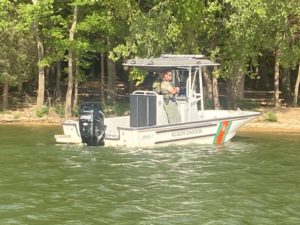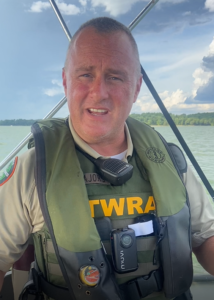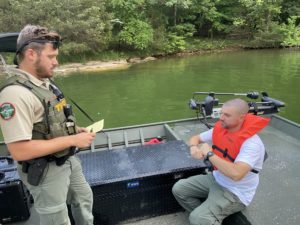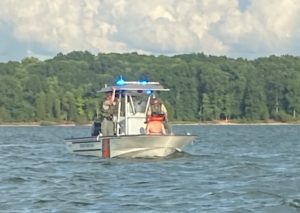Ride-Along with Tennessee Wildlife Resources Agency
On July 1, 2021, the new Tennessee Boating Under the Influence (BUI) law took effect making BUI 1st -6th jail time penalties equal to Driving Under the Influence (DUI) 1st-6th jail time penalties AND ensuring that Vehicular Assault, Aggravated Vehicular Assault, Vehicular Homicide, and Aggravated Vehicular Homicide could be applied to both DUI and BUI. Still, over the July 4th weekend, Tennessee Wildlife Resource Agency (TWRA) law enforcement officers arrested 21 boat operators for BUI.

We had the opportunity to go on patrol with the TWRA this past weekend to see what it’s like keeping Tennessee waterways safe. We joined a team working a Friday evening shift on Percy Priest Lake, located about 10 miles east of Nashville. About a dozen boats were stopped for wake zone violations, registration violations, and reckless operation.

Boating Accident Investigator, Matt Majors, explained that, on the water, there are no speed limits, stop signs, or traffic lanes to help law enforcement identify signs of impairment. While the rules for operating a boat on water are much different than for driving a car on land, there ARE still rules. These rules are meant to keep everyone safe while enjoying Tennessee waters. TWRA officers on patrol are keeping watch to make sure that kids under 12 are wearing life jackets, there are enough life jackets on board for everyone, passengers are safely riding in the boat, the boat is navigating and interacting with other boat traffic safely, operators are properly observing “No Wake” zones and not operating recklessly, boats have appropriate lighting & other equipment, boats are legally registered for operation, and that boaters are not operating the boat while impaired.
Majors says a huge part of a TWRA officer’s job is, what he calls, educational enforcement. An officer who observes a safety violation of some kind will stop a vessel to alert the boat operator of the problem and educate them about why the problem puts them and/or their passengers at risk. In many cases, the officer won’t even write a ticket for the violation. Their goal is simply to educate and correct the behavior. While stopped, the officer may check to ensure that other boating regulations are being followed as well. It is often during these interactions with boaters that officers first notice signs of impairment.

Most of us are familiar with field sobriety tests on land such as the “walk and turn” in which drivers are asked to follow a series of directions including walking toe to toe along a straight line. However, recognizing that some of the tests normally conducted on land to detect impairment are not feasible on a boat, the U.S. Coast Guard and the National Association of State Boating Law Administrators developed the Seated Battery of Standardized Field Sobriety Testing (SFST). (The Seated Battery of SFST has been validated by the Southern California Research Institute, the same organization that researched sobriety testing for the National Highway Traffic Safety Administration and International Association of Chiefs of Police.) As the term implies, boaters are seated as they are asked to follow a series of directions given by the officer. In place of tests like the “walk and turn,” they are asked to do tests to show hand coordination instead.

Of the boats stopped on Friday night, four boat operators were asked to participate in field sobriety testing to check for impairment. Officers determined that three of the operators were not impaired and let them return to their boats. One boat operator, however, was arrested for Boating Under the Influence.
Majors talked with us about some of the challenges in removing impaired boat operators from the water. Once the alleged impaired operator is removed from the vessel, it cannot be left unmanned in the middle of the water while the operator is taken to jail. There may or may not be anyone else on the boat capable of safely operating it which means officers must secure the vessel and arrange for transport back to the dock. If there are passengers on the operator’s boat, officers are cognizant that if they are impaired, they are at higher risk for falling overboard and drowning, and thus, have to take steps to ensure their safety as well. For these reasons, officers frequently work in teams of at least two boats to facilitate the logistics involved with keeping an impaired operator, his/her passengers, and other nearby boaters safe.
Majors explained that it is not uncommon for boat operators to remark that they did not realize how impaired they were. Environmental stressors in a marine environment, such as motion, vibration, engine noise, sun, wind and spray, accelerate a drinker’s impairment and cause fatigue that makes a boat operator’s coordination, judgment and reaction time decline even faster when using alcohol. In fact, research shows that people are just as impaired at .03 blood alcohol content (BAC) on the water as they are at .08 BAC on land. Because of these environmental stressors, the effect of drugs is also amplified when boating. In addition to illegal drugs, Majors also sees boaters on prescription drugs who are impaired.
While TWRA officers encourage everyone to go out and enjoy Tennessee waterways, they are dedicated to educating the public about boater safety including the dangers of drinking and boating. We are grateful for their diligent efforts to remove impaired boaters from the water and keep Tennesseans safe!
